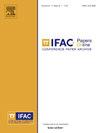Hierarchical Model Predictive Control for Modular Multilevel Converters: A Linear Parameter Varying Approach
Q3 Engineering
引用次数: 0
Abstract
Modular multilevel converters (MMCs) are novel voltage source converters (VSCs) with the capacity to achieve higher efficiency and lower total harmonics distortion, but more challenging to control. MMCs can be modelled using a hierarchical structure comprising a model predictive controller (MPC) that controls the current in the top layer and sends signals to capacitor voltage modules in the lower layer (which can run in open-loop or closed-loop with a simple local controller). Typically, the prediction model used in the MPC current controller does not take into account the capacitor voltage dynamics in the bottom layer, which reduces the efficiency of the hierarchical control scheme and MMC circuit. Therefore, in this paper, we develop an extended prediction model for current control that includes the capacitor voltage dynamics for the modules in the bottom layer. This results in a nonlinear MPC control problem of higher complexity but with improved performance. To reduce the complexity of the nonlinear MPC problem for MMCs, we make use of a linear parameter varying embedding of the nonlinear prediction model, which allows solving a sequence of quadratic programs online instead of a nonlinear program. The proposed control scheme shows better performance while decreasing the computation load. Furthermore, compared to classical hierarchical control schemes, the proposed scheme reduces the capacitor voltage ripple by 20%.
模块化多电平转换器的分层模型预测控制:线性参数变化方法
模块化多电平转换器(MMC)是一种新型电压源转换器(VSC),具有更高的效率和更低的总谐波失真,但控制起来更具挑战性。MMC 可采用分层结构建模,包括一个模型预测控制器 (MPC),该控制器可控制顶层的电流,并向下层的电容器电压模块发送信号(可通过一个简单的本地控制器开环或闭环运行)。通常情况下,MPC 电流控制器中使用的预测模型不会考虑底层电容器电压的动态变化,这就降低了分层控制方案和 MMC 电路的效率。因此,在本文中,我们开发了一种用于电流控制的扩展预测模型,其中包括底层模块的电容器电压动态。这就产生了一个非线性 MPC 控制问题,其复杂度更高,但性能更好。为了降低 MMC 非线性 MPC 问题的复杂性,我们利用了非线性预测模型的线性参数变化嵌入,从而可以在线求解一系列二次方程程序,而不是非线性程序。所提出的控制方案在降低计算负荷的同时,显示出更好的性能。此外,与经典的分层控制方案相比,所提出的方案可将电容器电压纹波降低 20%。
本文章由计算机程序翻译,如有差异,请以英文原文为准。
求助全文
约1分钟内获得全文
求助全文
来源期刊

IFAC-PapersOnLine
Engineering-Control and Systems Engineering
CiteScore
1.70
自引率
0.00%
发文量
1122
期刊介绍:
All papers from IFAC meetings are published, in partnership with Elsevier, the IFAC Publisher, in theIFAC-PapersOnLine proceedings series hosted at the ScienceDirect web service. This series includes papers previously published in the IFAC website.The main features of the IFAC-PapersOnLine series are: -Online archive including papers from IFAC Symposia, Congresses, Conferences, and most Workshops. -All papers accepted at the meeting are published in PDF format - searchable and citable. -All papers published on the web site can be cited using the IFAC PapersOnLine ISSN and the individual paper DOI (Digital Object Identifier). The site is Open Access in nature - no charge is made to individuals for reading or downloading. Copyright of all papers belongs to IFAC and must be referenced if derivative journal papers are produced from the conference papers. All papers published in IFAC-PapersOnLine have undergone a peer review selection process according to the IFAC rules.
 求助内容:
求助内容: 应助结果提醒方式:
应助结果提醒方式:


